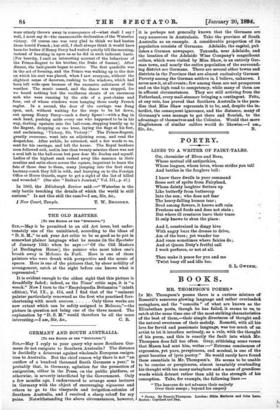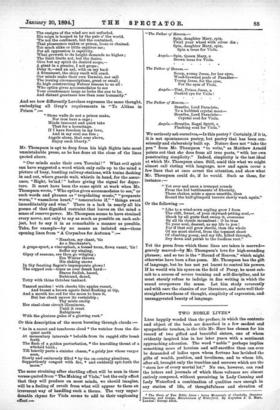BOOKS.
MR. THOMPSON'S POEMS.*
IN Mr. Thompson's poems there is a curious mixture of Rossetti's sensuous glowing language and rather overloaded. metaphors, and the " conceits " of what are known as the Elizabethan poets, though he has failed, it seems to us, to catch at the same time one of the most striking characteristics of the best of them,—their simple directness of thought anda the natural sweetness of their melody. Rossetti, with all his lovefor fervid and passionate language, was too much of an artist to let it interfere seriously, as a rule, with the thought of his poem, and this is exactly the fault into which Mr. Thompson does fall too often. Gray, criticising some verses that Mason had sent him, writes :—" Extreme conciseness of expression, yet pure, perspicuous, and musical, is one of the great beauties of lyric poetry." He would rarely have found these essentials in Mr. Thompson's. He seems to be unable to be concise or perspicuous, almost invariably overloading his thought with too many metaphors and a mass of grandiose words which detract rather than add to the strength of his conception. Take, for example, the following lines
"The heavens do not advance their majesty Over their maage ; beyond his empery
• Poems. By Francis Thompson. London: Elkin Mathews an John Lane, Boston: Copeland and Day.
The ensigns of the wind are not unfurled. His reign is hooped in by the pale o' the world. 'Tie not the continent, but the contained, That pleasaunce makes or prison, loose or chained. Toe much alike or little captives me; For all oppression is captivity.
What groweth to its height demands no higher ; The limit limits not, but the desire.
Give but my spirit its desired scope,— A giant in a pismire, I not grope ; Deny it,—and an ant, with on my back A firmament, the skiey vault will crack.
Our minds make their own Termini, nor call The issuing circumscriptions, great or small • So high constructing Nature lessons to us all: Who optics gives accommodates to see Your countenance large as looks the sun to be.
And distant greatness less than near humanity."
And see how differently Lovelace expresses the same thought, embodying all Gray's requirements in "To Althea in Prison "
"Stone walls do not a prison make,
Nor iron bars a cage ; Minds innocent and quiet take That for a hermitage.
If I have freedom in my love, And in my soul am free ; Angels alone, that soar above, Enjoy such liberty."
Mr. Thompson is apt to drop from his high flights into most unmistakable prose, as he has done at the close of the lines quoted above.
"Our minds make their own Termini !" What evil spirit can have suggested a word which only calls up to the mind a picture of busy, bustling railway-stations, with trains dashing in and out, where guards wait, whistle in hand, for the assur- ance, "Right, be'ind ! " before giving the signal for depar- ture. It must have been the same spirit at work when Mr. Thompson wrote, "Who optics gives accommodates to see," or such words and phrases as " trepidating music," " preparate worm," " wassailons heart," "temerarious if," "things sweet immeditatably and wise." There is a lack in nearly all his poems of that dignified restraint that leaves on the mind a sense of reserve power. Mr. Thompson seems to have strained every nerve, not only to say as much as possible on each sub- ject, but to say it in as remarkable a manner as possible. Take, for example—by no means an isolated one—these opening lines from "A Corymbus for Autumn" :—
"Hearken, my chant,
As a Bacchante's, A grape-spurt, a vine-splash, a tossed tress, flown vaunt, 'tis !
Suffer my singing,
Gipsy of seasons, ere thou go winging ;
Ere Winter throws His sinking snows In thy feasting flagon's impurpurate glows !
The sopped sun—toper as ever drank hard—
Stares foolish, hazed, Rubicund, dazed, Totty with thine October tankard.
Tanned maiden ! with cheeks like apples russet, And breast a brown agaric faint-flushing at tip, And a mouth too red for the moon to buss it, But her cheek unvow its vestalship ; Thy mists enclip Her steel-clear circuit illuminous, Until it crust Rubiginous With the glorious gules of a glowing rust."
Or this description of the moon bursting through clouds :— " As in a secret and tenebrous cloud * the watcher from the dis- quiet earth
At momentary intervals * beholds from its ragged rifts break forth The flash of a golden perturbation, * the travelling threat of a witched birth ;
Till heavily parts a sinister chasm,* a grisly jaw whose verges soon,
Slowly and ominously filled * by the on-coming plenilune, Supportlessly congest with fire, * and suddenly spit forth the moon."
The same straining after startling effect will be seen in these verses quoted from "The Making of Viola," but the only effect that they will produce on most minds, we should imagine, will be a feeling of revolt from what will appear to them an irreverent way of handling such a theme. The very unpar- donable rhyme for Viola seems to add to their unpleasing effect
" The Father of Heaven.—
Spin, daughter Mary, spin, Twirl your wheel with silver din ; Spin, daughter Mary, spin,
Spin a tress for Viola.
Angels.—Spin, Queen Mary, a Brown tress for Viola.
. . •
The Father of Heaves.—
Scoop, young Jesus, for her eyes, Wood-browned pools of Paradise— Young Jesus, for the eyes, For the eyes of Viola.
Angels.—Tint, Prince Jesus, a Dusked eye for Viola!
The Father of Heaven.—
Breathe, Lord Paraclete, To a bubbled crystal meet— Breathe, Lord Paraclete- Crystal soul for Viola.
Angels.—Breathe, Regal Spirit, a Flashing soul for Viola."
We seriously ask ourselves,—Is this poetry ? Certainly, if it is, it is not spontaneous poetry, but poetry that has been con- sciously and elaborately built up. Nature does not "take the pen" from Mr. Thompson "to write," as Matthew Arnold points out that she does from all true poets, "with her own penetrating simplicity." Indeed, simplicity is the last ideal at which Mr. Thompson aims. Still, amid this what we might almost call rioting with language, now and again occur a few lines that at once arrest the attention, and show what Mr. Thompson could do, if he would. Such as these, for instance :—
"Yet ever and anon a trumpet sounds
From the hid battlements of Eternity, Those shaken mists a space unsettle, then
Round the half-glimpsed turrets slowly wash again."
Or the following :— "Like to a wind-sown sapling grow I from The clift, Sweet, of your skyward-jetting soul,—
Shook by all gusts that sweep it, overcome By all its clouds incumbent : 0 be true To your soul, dearest, as my life to you!
For if that soil grow sterile, then the whole Of me must shrivel, from the topmost shoot Of climbing poesy, and my life, killed through, Dry down and perish to the foodless root."
Yet the poem from which these lines are taken is marred— gravely marred—by Mr. Thompson's love for high-sounding phrases; and so too is the "Hound of Heaven," which might otherwise have been a fine poem. Mr. Thompson has the gift of language, but he has not yet learnt to control his powers. If he would win his spurs on the field of Poesy, he must sub- mit to a course of severe training and self-discipline, and he must sternly refuse to indulge in fine writing in which the sound overpowers the sense. Let him study reverently and with care the classics of our literature, and note well their straightforwardness of thought, simplicity of expression, an unexaggerated beauty of language.



































 Previous page
Previous page